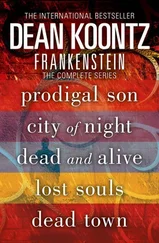Lined up on the kitchen table were green-grape-and-apple pies. The thick domed crusts, with their deeply fluted edges, were the coppery gold of precious coins.
Barty pointed at the table. “Pie, pie, pie, pie, pie, pie, pie, pie."
“Not yours,” Agnes advised. “We've got one of our own in the refrigerator."
“Pie, pie, pie, pie, pie, pie, pie, pie,” Barty repeated in the same tone of self-satisfied delight that he used when announcing “Barty potty."
“No one starts the day with pie, “Agnes said. “You get pie after dinner."
Thrusting his finger toward the table with each repetition of the word, Barty happily insisted, “Pie, pie, pie, pie, pie, pie, pie, pie."
Edom had turned away from the box of groceries that he was packing. Frowning at the pies, he said, “You don't think. . .
Agnes glanced at her brother. “Think what?"
“Couldn't be,” said Edom.
“Pie, pie, pie, pie, pie, pie, pie, pie."
Edom removed two of the pies from the table and put them on the counter near the ovens.
After following his uncle's movements, Barty looked at the table again. “Pie, pie, pie, pie, pie, pie."
Edom transferred two more pies from table to counter.
Thrusting his finger four times at the table, Barty said, “Pie, pie, pie, pie."
Although her hands were shaking and her knees felt as though they might buckle, Agnes lifted two pies off the table.
Jabbing his forefinger at each of the remaining treats, Barty said, “Pie, pie."
Agnes returned the two that she had lifted off the table.
“Pie, pie, pie, pie.” Barty grinned at her.
Amazed, Agnes gaped at her baby. The throat lump that blocked her speech was part pride, part awe, and part fear, though she didn't at once understand why this wonderful precociousness should frighten her.
One, two, three, four-Edom took away all the remaining pies. He pointed at Barty and then at the empty table.
Barty sighed as though disappointed. “No pie."
“Oh, Lord,” said Agnes.
“Another year,” Edom said, “and instead of me, Barty can drive the car for you."
Her fear, Agnes suddenly realized, arose from her father's often expressed conviction that an attempt to excel at anything was a sin that would one day be grievously punished. All forms of amusement were sinful, by his way of thinking, and all those who sought even the simplest entertainment were lost souls; however, those who desired to amuse others were the worse sinners, because they were overflowing with pride, striving to shine, eager to make themselves into false gods, to be praised and adored as only God should be adored. Actors, musicians, singers, novelists were doomed to hell by the very acts of creation which, in their egomania, they saw as the equal of their Creator's work. Striving to excel at anything, in fact, was a sign of corruption in the soul, whether one wanted to be recognized as a superior carpenter or car mechanic, or a grower of prize roses. Talent, in her father's view, was not a gift from God, but from the devil, meant to distract us from prayer, penitence, and duty.
Without excellence, of course, there would be no civilization, no progress, no joy; and Agnes was surprised that this sharp bur of her father's philosophy had stuck deep in her subconscious, prickling and worrying her unnecessarily. She'd thought that she was entirely clean of his influence.
If her beautiful son was to be a prodigy of any kind, she would thank God for his talent and would do anything she could to help him achieve his destiny.
She approached the kitchen table and swept her hand across it, to emphasize its emptiness.
Barty followed the movement of her hand, raised his gaze to her eyes, hesitated, and then said questioningly, “No pie?"
“Exactly,” she said, beaming at him.
Basking in her smile, the boy exclaimed, “No pie!"
“No pie!” Agnes agreed. She parenthesized his head with her hands and punctuated his sweet face with kisses.
FOR AMERICANS OF Chinese descent-and San Francisco has a large Chinese population-1965 was the Year of the Snake. For Junior Cain, it was the Year of the Gun, though it didn't start out that way.
His first year in San Francisco was an eventful one for the nation and the world. Winston Churchill, arguably the greatest man of the century thus far, died. The United States launched the first air strikes against North Vietnam, and Lyndon Johnson raised troop levels to 150,000 in that conflict. A Soviet cosmonaut was the first to take a space walk outside an orbiting craft. Race riots raged in Watts for five fiery days. The Voting Rights Act of 1965 was signed into law. Sandy Koufax, a Los Angeles Dodger, pitched a perfect game, in which no hitter reached first base. T. S. Eliot died, and Junior purchased one of the poet's works through the Book-of-the-Month Club. Other famous people passed away: Stan Laurel, Nat King Cole, Le Corbusier, Albert Schweitzer, Somerset Maugham.... Indira Gandhi became the first woman prime minister of India, and the Beatles' inexplicable and annoying success rolled on and on.
Aside from purchasing the T S. Eliot book, which he hadn't found time to read, Junior was only peripherally aware of current events, because they were, after all, current, while he tried always to focus on the future. The news of the day was but a faint background music to him, like a song on a radio in another apartment.
He lived high, on Russian Hill, in a limestone-clad building with carved Victorian detail. His one-bedroom unit included a roomy kitchen with breakfast nook and a spacious living room with windows looking down on twisty Lombard Street.
Memory of the Spartan decor of Thomas Vanadium's house lingered with Junior, and he addressed his living space with the detective's style in mind. He installed a minimum of furniture, though all new and of higher quality than the junk in Vanadium's residence: sleek, modem, Danish-pecan wood and nappy oatmeal-colored upholstery.
The walls were barren. The only art in these rooms was a single sculpture. Junior was taking university extension courses in art appreciation and almost daily haunting the city's countless galleries, constantly deepening and refining his knowledge. He intended to refrain from acquiring a collection until he was as expert on the subject as any director of any museum in the city.
The one piece he had purchased was by a young Bay Area artist, Bavol Poriferan, about whom art critics nationwide were in agreement: He was destined for a long and significant career. The sculpture had cost over nine thousand dollars, an extravagance for a man trying to live on the income of his hard-won and prudently invested fortune, but its presence in his living room immediately identified him, to cognoscenti, as a person of taste and cutting-edge sensibilities.
The six-foot-tall statue was of a nude woman, formed from scrap metal, some of it rusted and otherwise corroded. The feet were made from gear wheels of various sizes and from bent blades of broken meat cleavers. Pistons, pipes, and barbed wire formed her legs. She was busty: hammered soup pots as breasts, corkscrews as nipples. Rake-tine hands were crossed defensively over the misshapen bosom. In a face sculpted from bent forks and fan blades, empty black eye sockets glared with hideous suffering, and a wide-mouthed shriek accused the world with a silent but profound cry of horror.
Occasionally, when Junior returned home from a day of gallery hopping or an evening at a restaurant, Industrial Woman-the artist's title-scared away his mellow mood. More than once, he'd cried out in alarm before realizing this was just his prized Poriferan.
Waking from a bad dream, he sometimes thought he heard the ratcheting of gear-wheel feet. The scrape and creak of rusted iron joints. The clink of rake-tine fingers rattling against one another.
Читать дальше











